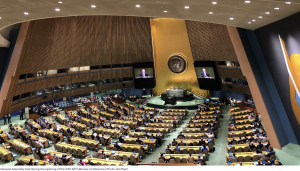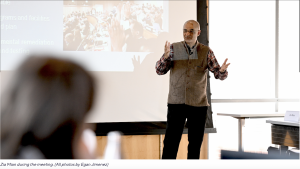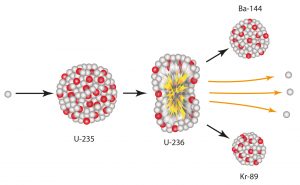Princeton University’s Program on Science and Global Security (SGS), based in the School of Public and International Affairs, conducts scientific, technical and policy research, analysis and outreach to advance national and international policies for a safer and more peaceful world.
The Program was founded in 1974 by physicists in Princeton’s School of Engineering and Applied Science as part of Center for Energy and Environmental Studies and moved to Princeton’s School of Public and International Affairs in 2001. Harold Feiveson and Frank von Hippel founded and co-directed the Program from 1974 to 2006. From 2006 to 2016, the Program was directed by Christopher Chyba. Since 2016, SGS has been directed by Alexander Glaser and Zia Mian.
Throughout its history, SGS has worked on nuclear arms control, nonproliferation, and disarmament to reduce the dangers from nuclear weapons and nuclear power. It is one of the oldest and most highly regarded academic programs focused on technical and policy studies on nuclear issues in the world. In the past decade it also has advanced policy on biosecurity issues. SGS engages effectively and creatively with these long-standing policy issues that remain to resolved and tracks emerging challenges from disruptive technologies with the potential to transform global security. These include new biotechnologies, information and communications technologies, autonomous weapons, artificial intelligence, and space-based systems.
- Rethinking racism, exclusion and domination in nuclear security studiesRethinking racism, exclusion and domination in nuclear security studies Princeton University’s Program on Science and Global Security (SGS) has created and maintains a bibliographic archive of interdisciplinary scholarly and other…
- Informing global nonproliferation and disarmament diplomacyPrinceton University’s SGS informs and advances international multilateral efforts, providing expert briefings to the Non-Proliferation Treaty (NPT) countries and the states of the Treaty on the Prohibition of Nuclear Weapons (TPNW).
- Princeton School on Science and Global SecuritySGS hosts the Princeton School on Science and Global Security, which brings together next-generation scientists and engineers from around the world to learn technical and policy perspectives on how to reduce and end the threat from nuclear weapons.
- International Panel on Fissile MaterialsThe IPFM was founded in January 2006 and is an independent group of arms-control and nonproliferation experts from both nuclear weapon and non-nuclear weapon states.
- Science & Global SecurityScience & Global Security is an international journal for peer-reviewed scientific and technical studies to support international security, arms control, disarmament, and nonproliferation policy.
- Physicists Coalition for Nuclear Threat ReductionOur goal is to reach out to physicists in the United States and mobilize those interested in opportunities for nuclear threat reduction. We welcome physical scientists broadly, including those in engineering.
- Shadows and Ashes: The Perils of Nuclear WeaponsThis exhibit of art and science examines the role of nuclear weapons in our society and reflects on their results.






